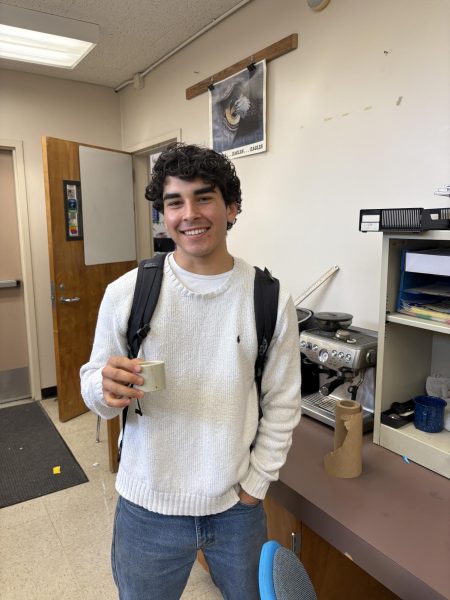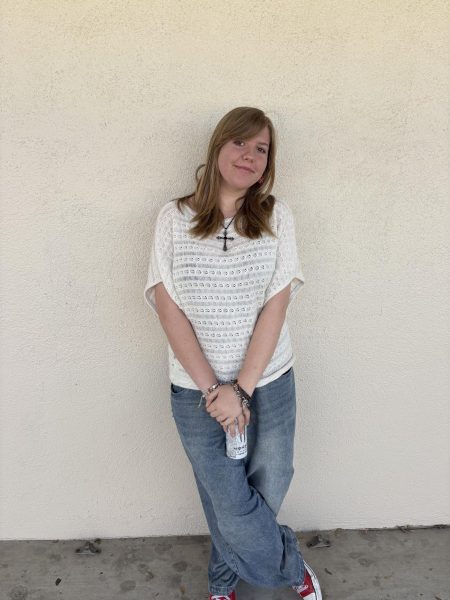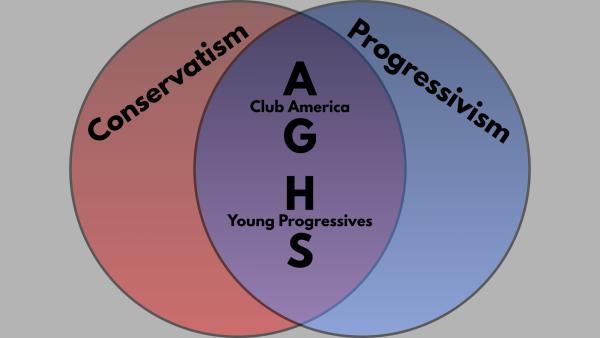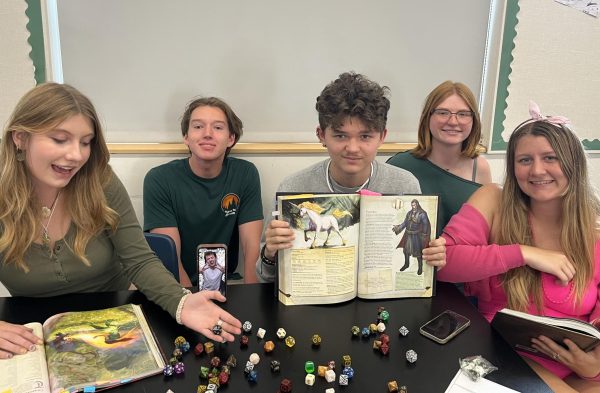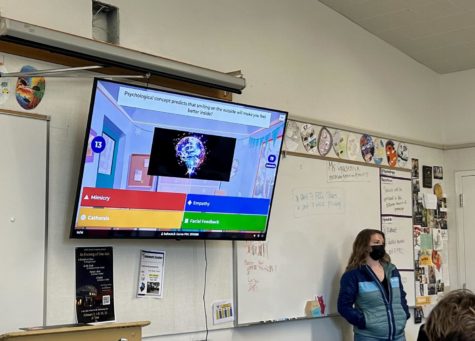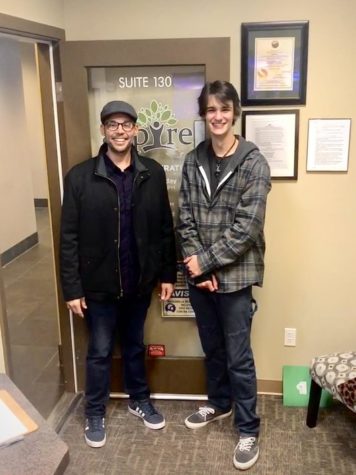AGHS offers resources for mental wellness
The national alliance on mental illness provides resources to San Luis Obispo County for a range of struggles and is a very accessible resource providing hotlines, support groups, and more.
Regardless of personal struggle, asking for help and support can be terrifying. Pushing past the thick stigma surrounding the topic and asking for help with mental health struggles isn’t wrong, cowardly, or telling of a weak character. It’s one of the bravest and most courageous things a person can do. Therefore, it’s vital that students are aware of resources both on and off campus, so they can safely get the help they need and deserve. Resources are listed at the bottom of the story.
However supportive and kind, parents can be challenging to open up to, as younger people often feel the need to impress and perform according to their parent’s standards. Kari Holtzman, AGHS’s Psychologist, understands this struggle, noting that no matter how students present themselves on paper, everyone struggles and deserves a listening ear and support. She also has experienced the inaccuracy of how students may seem on the surface personally, encountering it as a professional in her field and a parent.
“I have a son who had an IEP, and has some diagnosis’…I share with both parents and students my experience because my very academically inclined daughter also has some mental health issues…everyone struggles; we see people in here that have straight A’s, we see people in here that have straight F’s,” Holtzman said.
Holtzman tries to be a positive outlet on campus, lending kindness and support to students who might knowingly or unknowingly need it.
“I always welcome people with a smile…we try very hard to make this space open for students and try to touch base with everyone that walks in and get why they’re here,” Holtzman said.
Kelli Peters, who teaches AP European History, communicates to students that she is a resource by remaining authentic and being open to talking with students.
It’s harder for students to reach out for help when they do not feel comfortable enough to open up to someone, and when mental illness is left untreated, the risk of suicide increases. The National Alliance on Mental Illness reported as of June 2022, 50.6% of youth aged 5-17 received mental health care, and suicide is the 2nd leading cause of death for the age group.
For students, feeling comfortable asking for help from any trusted adult, whether at school or elsewhere, can be the difference between life and death. Teachers at AGHS try to be empathetic to their student’s unseen struggles, making themselves available for those who need support.
“[I]try to do my best to be really transparent with them about it, to say ‘yes it’s an AP class, there’s going to be a lot of stressors that come with that but also, come talk to me’, and really try to open myself up and say ‘When you’re stressed out, you have to let me know,’ I can’t read their minds,” Peters said.
Peters also emphasized that her course is academically rigorous, she presents strategies and values that ease stress and support students’ well-being.
“I try to ask students, what do you need from me, and what do you need from yourself, so they know this is a classroom where they can ask questions, they can be unsure…I try to put myself in their shoes,” Peters said.
By creating a comfortable and open classroom/school environment, students who are struggling with anything from mild to serious mental health issues can feel safer opening up to adults. However beneficial in the long run, taking the first step towards mental health recovery can be daunting and confrontational.
“Try to find some kind of trusted adult on campus, whether it’s a teacher…or an advisor or a counselor, and maybe that person can help and be a spokesperson for a little while, but also by talking with them, maybe it can help you build up a little confidence,” Peters said.
Another critical factor in maintaining mental wellness is recognizing that change is possible and struggle doesn’t define someone’s future or worthiness. As a school, we should be working on lessening and ultimately completely removing stigma and shame about needing help and support with mental struggles.
Resources are listed below for additional professional help with mental illness or substance abuse recovery. Although teachers and school staff aren’t the first choices for professionals in mental health care and advocacy, their actions can push students in a positive direction, leading them to eventually advocate for themselves more comfortably.
“I think that’s a really big thing that students can learn throughout high school…how to understand what their body is telling them and what their mind is telling them, ‘I am overwhelmed right now, and I am stressed out, how do I recognize that in myself so I can take a break, and once I do recognize that feeling, or whatever my body is reacting to…then how do I advocate for myself in that situation,” Peters said.
Listed below are off-campus resources for recovering from mental health issues or substance abuse:
CRISIS SUPPORT: National US Crisis Hotline: 988
NAMI Helpline:
- Call: 1-800-950-NAMI (6264)
- Text: 62640
- Chat: nami.org/help
SAMHSA Crisis Help Lines:
- 1-800-662-HELP (4357)
- 1-800-985-5990
- Provides referrals to local treatment centers, group therapy(for mental distress & substance abuse)
Central Coast Hotline: 24/7 all year
- 1-800-783-0607
Lumina Crisis Line:
- Confidential domestic violence, sexual assault, and intimate partner violence crisis line.
- (805-545-8888)
Child Protective Services Hotline: CPS
- SLO County: (805)-781-5437 & (800)-834-5437
- Santa Barbara County: (800)-367-0166
SLO Crisis Support Hotline:
- (800) 549-4499
NON-CRISIS EATING DISORDER SUPPORT:
NEDA: National Eating Disorder Association
-
- Online Chat
Monday—Thursday 9 am—9 pm ET
Friday 9 am—5 pm ET
- Online Chat
- Call
(800) 931-2237
Monday—Thursday 11am—9pm ET
Friday 11am—5pm ET
Translation services are available on the phone.
-
- Text
(800) 931-2237
Monday—Thursday 3 pm—6 pm ET
Friday 1 pm—5 pm ET
Standard text messaging rates may apply.
- Text
- For Parents and Family:
https://www.nationaleatingdisorders.org/parent-toolkit
- Call toll free: 1 (888)-375-7767
- Hours: Monday-Friday, 9 am-9 pm CST
Central Coast Treatment Center
- Offers Residential, PHP, and IOP treatment programs
- Call: (805) 752-1112 (Not a 24/7 helpline or for urgent/crisis situations)
- Email: [email protected]
- Support group, Wednesdays at 6 PM
- 508 Higuera St, SLO
NON-CRISIS SUBSTANCE ABUSE SUPPORT
- Offers an adult program as well as a teen program.
- PHP and IOP programs
- Call: (888) 585-7373
- Substance abuse treatment through detox, IV drip therapy, and ketamine treatments
- IOP program
- Includes individual, group, and family counseling
- Call: (805) 242-1360
Alcoholics Anonymous SLO
- Call: (805) 541-3211
- Link to meeting times: https://www.sloaa.org/meetings/
- Call: 1 (800) 782-1520
- 115 E Fesler St, Santa Maria CA
- IOP, PHP, and residential programs
DOMESTIC ABUSE AND SEXUAL ASSAULT VICTIM SUPPORT
- Domestic Violence Hotline: 800-799-7233
Stand Strong SLO:
- Call(non-crisis): 805-781-6401
- Emergency Housing
- Transitional Housing
- Counseling Services, legal services
- Education and prevention

Mia Hinds is a senior at AG High School, and is in her second and final year with the Eagle Times. She has a dog named Miko, who is a pitbull and husky...



